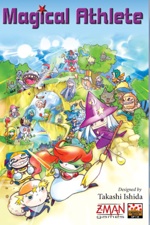by Andy Vetromile
 Magical Athlete (2010)
Magical Athlete (2010)
Published by Z-Man Games
Designed by Takashi Ishida
Illustrated by Umino Senri
Contents: 25 character cards, two-sided board, 24 markers, 25 stand ups, 5 plastic bases, 1 six-sided die, 1 reference sheet, & rulebook.
Playing time: 60-90 minutes
$24.99
Most events would cut you from the sport if they found you juicing or
using advantages not available to other participants, but when you're a
centaur everyone understands if you kick the guy standing behind you in
the face for that needed edge. Magical Athlete, a new race game
from Z-Man Games, lets players unleash a horde of weird fantasy
creatures and people onto the racetrack in a bid for glory.
The object of the game is to have the most points after finishing a
series of races.
Ready, Set...
The game splits into two parts. In the first, 3-5 players draft various
fantasy creatures onto their team. Taking turns, players each pull a
fresh face from the deck and add it to a "rogues gallery" of available
characters. With only so much money to hire their favorites, they may
not like paying premium prices when someone they want appears, but the
cards shift down the row and become cheaper the longer they stay on the
block. Wait too long and the good ones may go to the other team. When a
card is chosen, the player also gets the standup counter that goes with
it and an interchangeable plastic stand.
 Once the teams are decided, players are subjected to a series of heats
using one of their athletes for each race. The 30-space track goes up
one side of the board, U-turns, and comes back up the other side.
Players take turns rolling a six-sided die to see how far their entrant
advances, but since everyone has a special ability it's never a simple
matter of adding up die rolls. The Siren, for example, pulls everyone
toward her at the start of her turn – those behind her move
forward, those who have passed her find themselves drawn back from the
Goal. The Ninja shadows people, taking the same move as the person they
share a space with, and the Martial Artist skips over occupied spaces
when counting out the results of his roll. Some powers like the Siren's
are Duties (in other words, she can't choose not to use her ability),
but most are optional. On the other hand, few people choose not to
exercise their rule tweaks. Also, a couple of characters have powers
they use outside the context of the race (the Assassin, for instance,
has the option to eliminate a character and force his replacement with a
random draw before the start of the contest).
Once the teams are decided, players are subjected to a series of heats
using one of their athletes for each race. The 30-space track goes up
one side of the board, U-turns, and comes back up the other side.
Players take turns rolling a six-sided die to see how far their entrant
advances, but since everyone has a special ability it's never a simple
matter of adding up die rolls. The Siren, for example, pulls everyone
toward her at the start of her turn – those behind her move
forward, those who have passed her find themselves drawn back from the
Goal. The Ninja shadows people, taking the same move as the person they
share a space with, and the Martial Artist skips over occupied spaces
when counting out the results of his roll. Some powers like the Siren's
are Duties (in other words, she can't choose not to use her ability),
but most are optional. On the other hand, few people choose not to
exercise their rule tweaks. Also, a couple of characters have powers
they use outside the context of the race (the Assassin, for instance,
has the option to eliminate a character and force his replacement with a
random draw before the start of the contest).
Points are awarded for first and second place after each run, and when
all the races are done the points are added up to determine the overall
winner.
Sporting Goods
The components generate few complaints. Cardstock continues to be an
issue with most decks, and the five plastic stands for the character
counters must be reused for every race – more wear and tear on the
standups as they get switched out. But the stands are designed to let
the pieces slide in and out easily (and they stay together nicely during
use), so any damage should be minimal. The board is mounted, foldout,
and double-sided, with the row of athlete-drafting spaces on one side
and the racetrack on the other. Its artwork is simple and
straightforward; the art budget went to the cards. Done in anime style
(the game is a Japanese transplant), the pictures are goofy and some
have a bit of a cultural disconnect as to, say, what qualifies as
looking like a Troll. Finally, the counters double as money for
purchasing cards during the drafting round and as victory point awards
after each heat, and these are thick-cut things that the much thinner
cards must envy.
And They're Off
No matter how powerful a character seems when it's drawn from the deck,
nothing is guaranteed once the race is underway. Entrants begin pushing
and pulling at one other, and the various abilities generate some
serious synergy. What seems like a sure thing even within site of the
Goal space can easily fall to some fatal fortune, keeping the outcome a
mystery until the bitter end. Then when it's all over... there's
another race to run. The rules are pretty good at anticipating problems,
combos, and loops, so they must have been playtested well (again, the
game is only new to Americans). One issue – if it's an issue at
all and not just a matter of personal preference – is that only
about half a dozen of the cards in Magical Athlete are really
creatures or "magicians" like the Ghoul, Medusa, Witch, and Conjurer.
The rest are characters or professions that serve as standard fantasy
tropes, such as the Merchant, Gladiator, Ranger, and Pirate. Can
supplemental character packs be far behind?
Tale of the Tape (aka Conclusions)
Anyone who doesn't like to trust their gaming to random chance may want
to run the other way. Regardless of the powers, the bulk of advancement
in Magical Athlete comes from rolling the six-sided die. There's
a good bit of memory and groupthink involved, and even then formulating
a strategy is hit-or-miss. For example, Cupid gets a movement bonus if
male and female characters occupy the same space, which is great if
there's even a pair of such figures in the same race as he (18 of the
cards are males, though one of those is Cupid himself). Since the game
goes through several runs, one would have to remember who has how many
of which gender to make intelligent use of this information, then
further guess in which race there's likely to be a combination Cupid can
use to his advantage. No one is going to win the game by cleverly
employing the right power at the right time. In short, there's no real
way to predict most things about the game and one must content oneself
to enjoying the controlled chaos of each race and seeing how various
combos interact. With these things in mind, and with two dozen fantasy
characters to select from, the pandemonium of Magical Athlete
remains fresh, unexpected, and a lot of fun for those looking for light
entertainment in their race games.
Links:
| Other Z-Man Games reviews on OgreCave: |
|
|


 Magical Athlete (2010)
Magical Athlete (2010) Once the teams are decided, players are subjected to a series of heats
using one of their athletes for each race. The 30-space track goes up
one side of the board, U-turns, and comes back up the other side.
Players take turns rolling a six-sided die to see how far their entrant
advances, but since everyone has a special ability it's never a simple
matter of adding up die rolls. The Siren, for example, pulls everyone
toward her at the start of her turn – those behind her move
forward, those who have passed her find themselves drawn back from the
Goal. The Ninja shadows people, taking the same move as the person they
share a space with, and the Martial Artist skips over occupied spaces
when counting out the results of his roll. Some powers like the Siren's
are Duties (in other words, she can't choose not to use her ability),
but most are optional. On the other hand, few people choose not to
exercise their rule tweaks. Also, a couple of characters have powers
they use outside the context of the race (the Assassin, for instance,
has the option to eliminate a character and force his replacement with a
random draw before the start of the contest).
Once the teams are decided, players are subjected to a series of heats
using one of their athletes for each race. The 30-space track goes up
one side of the board, U-turns, and comes back up the other side.
Players take turns rolling a six-sided die to see how far their entrant
advances, but since everyone has a special ability it's never a simple
matter of adding up die rolls. The Siren, for example, pulls everyone
toward her at the start of her turn – those behind her move
forward, those who have passed her find themselves drawn back from the
Goal. The Ninja shadows people, taking the same move as the person they
share a space with, and the Martial Artist skips over occupied spaces
when counting out the results of his roll. Some powers like the Siren's
are Duties (in other words, she can't choose not to use her ability),
but most are optional. On the other hand, few people choose not to
exercise their rule tweaks. Also, a couple of characters have powers
they use outside the context of the race (the Assassin, for instance,
has the option to eliminate a character and force his replacement with a
random draw before the start of the contest).